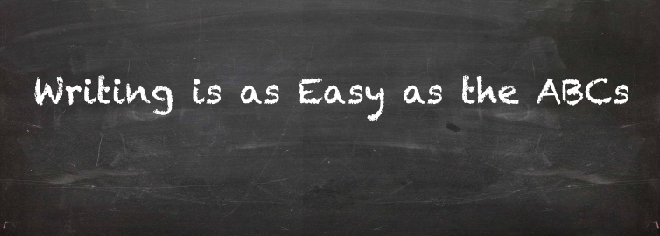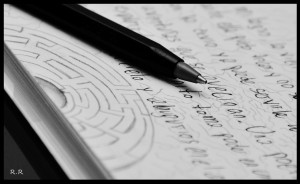I write to solve problems, to figure out what I need to say, and to access a part of my mind that goes unexplored much of the time.
When it comes to solving problems, I write a journal entry much like a mathematician solves an equation. I start with a problem and put pen to paper in order to find a solution. The problem-solving starts with an initial spark, an idea as to how to begin, and develops as I continue writing. When I have a serious decision to make or a mess to clean up, simply thinking about it makes me anxious and lost; there are too many options to sort through and each choice comes with its own set of implications. In order to explore these complexities in a more productive manner, I take to my journal and select a problem-solving method that I see fit. When choosing between two options, I often employ the “pro-con” list, whereas for a “mess” the step-by-step list imposes some order on a sticky situation:
- Park car with dent facing away from the house
- Call autobody shop and get appointment for a quote
- Go to autobody shop
- If you have enough money to cover it, you’re good. Send car to the shop next weekend when Mom and Dad are gone. If not, proceed to 5.
- Call Dad tomorrow after school tomorrow and say that you just hit the fence backing out of a spot that was way, way too tight and you are SO sorry. You will call the insurance company and try to deal with it yourself
- Pray
As someone who writes to discover rather than to iterate an already developed idea, my solve-as-I-go approach often found me in sticky situations in high school. Mr. Risley, my AP United States history teacher, requested that we turn in an outline, which he called a “laundry list” with our in-class essays. As soon as I finished reading the prompt, I would start in on my essay. However, as I looked around the room, I would notice that my classmates were writing their ideas into neatly-drawn charts with headings like “social implications,” and “political implications.” Many of them filled the lists with bulleted ideas and, when they finally got to the essay, they would simply string the bullets together. Although I’m sure Mr. Risley’s “laundry list” approach helped many of my peers to organize their arguments, outlines have never worked for me. My problem-solving occurs during the writing process. Just as I would begin writing in my journal to figure out how to solve a problem, I would start my essay in order to sort out my ideas. As I developed them, I would determine the meaning of the sum of my ideas and wrap them together in the conclusion. If I had time after finishing my essay, I would scrawl out a fake “laundry list” with a couple of words in each box to avoid the point-penalty for not submitting one. My friend Austin would roll his eyes and ask why it was so hard for me to just make a laundry list; if I did, I wouldn’t lose the points.
“Austin, I know it sounds weird, but I actually can’t start writing with a laundry list. If I do I’ll just draw the boxes and sit there staring at them for the entire period. It’s better for me to just write and figure it out from there.”
Just like my essays, my journal entries often start as a problem-solving effort and end once I have explored them to the point of drawing a conclusion. Somehow, this problem-solving process is a form of meditation for me. After making a pro-con list or a step-by-step list, I will ruminate on the situation and sometimes lose myself in it. I experience the state of blissful self-unawareness that my younger self shifted into and out of quite naturally. Writing is a task so deeply contemplative and consuming that it requires shedding my attachments to what is immediate in favor of occupying a different headspace. Once I become entirely absorbed in the process of writing, my consciousness of myself as an individual grounded by time, bound by obligations, and limited by a strong sense of self dissipates. It is the same space that I inhabit when I go for a run, sparked by some initial inspiration but lacking a destination. Eventually, I settle into a rhythm and fall comfortably into that precarious state between self-awareness and complete oblivion. Here, I can access my own thoughts on a level that is limited by awareness. I can explore these ideas without criticizing their quality or relevance and when I finally fall out of this state and lift pen from paper, I am left with a map of my mind and an understanding of it that self-consciousness does not permit.
~
I clean out my desk drawers every spring. I start a pile of old schoolwork and stray papers to be recycled and a bag of broken pens, worn out highlighters, and strange trinkets to be thrown away. I vacuum eraser shavings and dust out of the drawer liners. Once I finish these rather banal, yet somehow satisfying tasks, I allow myself to look at my old journals. All year they remain untouched at the back of my top drawer, gathering dust. Opening the front cover of any one of these journals always spurs a sort of anxiety in me. Although I have read them countless times, I fear what I will discover. The text remains the same, but the associations I make, the memories I recall, and the way I connect with my younger self changes from year to year.
This past spring, when I read one journal in particular, I noticed that my handwriting changed drastically from entry to entry. Starting with a comically illegible scrawl, I moved to tiny, typewriter-like print, to a bubbly cursive. Struggling to find a style that suited me, I tried every style of handwriting imaginable. My journal entries were punctuated by pages of the cursive alphabet copied over and over and my name signed in different styles. I eventually settled into a casual print.
I often engage in an analysis of my younger self while reading my journals. Perhaps my experimental changes in handwriting were an indication of my search for a sort of individuality: my desire to develop an idiosyncratic, easily identifiable script was a manifestation of my effort to develop a unique voice. Perhaps in describing how much I “love my new school!!!” and how “awesome” my new friends were, I was trying to convince myself of my happiness. Maybe the countless pages of carefully penned cursive script were an early indication of a perfectionism that would later have to be unlearned. Despite my attempt to take an academic, analytical view of my journals, I often experience fleeting, stirring moments of identification with my younger self where I am no longer analyzing her as if we are two separate beings. Curiously, it is not always detailed descriptions or flowery language that evoke a strong recollection in me. Last spring, it was a list:
- bricks from the Lupoli’s shed
- long rope
- wood chips
- tarp
- blankets
- milk crates.
I was back waiting at the Old Farm Way bus stop with Lilie, discussing plans for our new club as we watched our breath in the cold air. Manhunt at Ryan Gallagher’s house last night was awesome! We tricked everyone into thinking we were in the basement, but we were hiding in that big tree in the front yard! We didn’t like hiding inside because his house smelt like his cats and his dad was kind of scary. Even though Ryan and Eric teased us sometimes they were still our best friends and they were going to be part of our club. It would be way less babyish than our old spy club. We would have a secret hideout in the woods on Old Farm Way where we would hang out and spy on teenagers in the neighborhood. But it wouldn’t be like our spy club. Much cooler, for sure.
The bus screeched to a stop in front of Lilie’s house and the doors opened to the hot, smelly school bus air. We bounded past the kindergarteners, first graders, and second graders. Just before we plopped down in our seats (that were almost in the way back with the fourth graders!) the bus took off, sending us stumbling backward before we collapsed into our usual seat.
“If our club is gonna be good, our hideout has to be awesome.”
“It has to be really hidden so no one can find us.”
“We should make it like a little room!”
“That would be cool… what kind of stuff do we need?”
“We should get a TV!”
“I don’t think TVs work outside…”
“Oh- yeah. Well we’re gonna need bricks if we want a floor”
“Wait hold on let me get my notebook- we can make a list!”
Something about that list set off a chain of vivid, sensory memories that had been gathering dust with my journal. I recalled what it was like to be my younger self, to inhabit such a tiny body possessed by boundless energy and curiosity. For some, looking at an old photograph often evokes a strong recollection of a particular moment. For me, a journal entry evokes a far deeper recollection. A photograph is a snapshot. Although it can capture a fleeting moment and evoke an array of emotions, it is stuck in time. A journal entry is dynamic. I can read an old journal and trace my ideas from inception through their development; I can recall what it was like to think like my younger self and to experience the world as she did.
Over the years, my journals have lost some pages. As an easily embarrassed twelve-year-old, I would read a journal entry that I wrote two years earlier and if it upset me I would tear the page from the binding. Now, having a degree of distance from my younger self, I lament this loss of thoughts and memories, even if they are painful or humiliating ones. The old entries that I still have allow me to inhabit the mind of my younger self and experience things as she did. I am able to remember what it was like to eavesdrop on adult conversations and to try to make sense of them, to look at an ant hill like it was a curiosity, as if it was the first and last one I would ever see. I could get so wrapped up in a made-up game or a story that I would lose self-awareness entirely and become possessed by an uninhibited inquisitiveness. I would read Lemony Snicket books on the beach or practice my sashays and pas de bourees in line at the ice cream shop, completely unaware that anyone else was there, let alone watching. Recalling precisely how this felt, if only for a fleeting moment, is powerful.
~
Although I did not have my future self in mind when I began to write, reading my old journals reminds me that I write so that one day I will have maps of my thoughts processes, a concept of how my mind once worked, and a way to experience memories the way my younger self did. Just as some people take photos to preserve a moment to look back on, I write in part to preserve thoughts, sensations, and moments for my future self. My grandma once told me, after she saw me remove an unflattering photo of myself from a photo album, that you should never throw away a photo. The spirit behind that advice applies to my journal. I write because I regret tearing those pages out of my journal years ago. Although it is tempting to reconstruct my narrative, omitting bits that are humiliating, painful, or awkward to make my life appear less messy, I now understand the importance of keeping my narrative in tact. Recalling which experiences have challenged me, which memories have impacted me, and how I have developed allows me for a strong sense of myself as an ever-changing individual shaped by her past, but always evolving as she questions, explores, and discovers.
As a chronic worrier, rereading my journals always emphasizes that no matter how deeply embarrassing or heartbreaking an experience seems in the moment, when placed in a sequence of events, an ever-evolving narrative, it fits. Ebbs are followed by flows, and, as people have always told me, “things have a way of working themselves out.” I continue writing both for my future self, who will hopefully turn to my old journals to contemplate her past and, in that, find guidance for her future and for my current self, so that I can step outside of self-awareness and into a headspace that allows for contemplation and exploration of my own mind. To my future self, I know you will not heed this advice, but don’t worry. Continue writing and never rip a page out.



